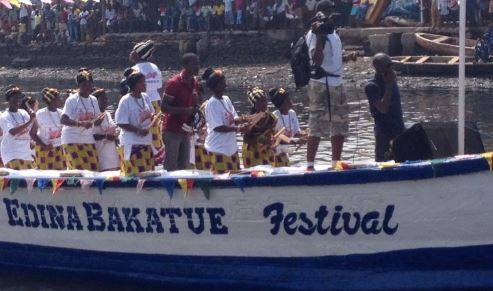A festival is a special occasion celebrated to remember a deity, ancestors, or agricultural reasons, just like Homowo is celebrated to remember a past famine. In this way, Homowo is an agricultural festival. A festival is also an occasion that is used to solve conflicts and is a day of homecoming. Most of the festivals in Ghana are characterized by drumming, dancing, feasting, and merrymaking.
In Ghana, a festival is held in the highest esteem, and it is a day that portrays culture, traditions, and a sense of belonging. There are a variety of traditional festivals in Ghana all year round, and these are some of the top 4 festivals in Ghana that you should not miss.
4. Simpa/ Winneba Aboakyir Festival
According to legend, they were instructed to sacrifice a young member of the royal family every year. This took a depleting toll on the royal family, so the people pleaded with their god and were told to sacrifice a leopard. However, sacrificing the leopard also resulted in high casualties, so they pleaded again to their god Otu; this time, the deity accepted an offering of a deer.
On the first day of the festival, the two Asfo companies (warrior groups) in Winneba, namely Dentsifo and Tuafo, compete in a hunting expedition to determine who catches the deer first and returns to the chief's palace. The deer is then sacrificed to signify the beginning of the Aboakyir festival. The festival is celebrated to thank the gods for a productive harvest.
3. Homowo Festival
Homowo is an agricultural and harvest festival celebrated by the chiefs and people of the Ga and Dangme traditional areas in the Greater Accra region. Homowo means hooting at hunger, thus, "Homo means hunger and Wo means hoot" in the Ga language. The festival lasts for three months, from the planting of maize in the month of May during the rainy season to August. The clans perform the 'Shibaa' rites, that is, the clearing and cleaning of the sacred farm for the planting of maize and millet.
According to oral history, the Ga and Dangme people suffered many hardships, including a severe famine that killed a lot of them. The famine happened during their migration from Egypt via Nigeria to their present home. The famine was attributed to a lack of rain, as a norm, the people consulted their god and were told to plant at a certain place. When the rain returned to normal and they had enough food to eat, they instituted the Homowo festival to honor the gods.
During the festival, a food called Kpokpoi and palm nut soup are sprinkled on the grounds, intended for the gods and other nature spirits and also to thank the gods for a bumper harvest.
2. Elmina/Edina Bakatue
Elmina is one of the ancient capitals of Ghana, and the festival is among the most popular in Ghana. It is celebrated by the chiefs and people of the Elmina or Edina traditional areas in the Central Region of Ghana. The word "Bakatue' means "the opening of the lagoon or the draining of the lagoon". The festival is celebrated on the first Tuesday in the month of July every year. Bakatue is celebrated to mark the beginning of the fishing season.
According to legend, the founder of Elmina Kwaw Amankwa migrated from the Walata Empire and settled at Techiman for some time. He then moved to Eguafo, an ancient town that is close to Elmina, and thence to Elmina. He and his people were thirsty when he reached Elmina, so he decided to search for drinking water. Fortunately, he discovered a streamlet that made Kwaw Amankwa exclaim, "Be-enya" which means I have found it or I have got it". Therefore, the festival was instituted to commemorate the incident.
During the festival, a net will be cast to signify the bumper fishing harvest. There is also a colorful canoe display amid dancing, singing, and sacrificing on the Benya Lagoon.
1. Oguaa Fetu Afahye
Arguably, this festival is the most popular traditional festival in Ghana and is attended by both Ghanaians and those in the diaspora as a whole. It is celebrated by the chiefs and people of Cape Coast traditional areas. Fetu Afahye is celebrated on the first Saturday of September every year. It is a weeklong festival that typically runs from Monday to Sunday.
According to oral tradition, a strange plaque hit the Oguaa land and killed a lot of people. The strange disease was so devastating that the people consulted their oracle, or diety, During the consultation, the god told them to do away with dirt and make sure to clean the environment thoroughly. After doing exactly as they were instructed by their diety, the strange disease stopped, so they instituted the festival to honor the gods, hence the meaning "Fe means dirt and Tu means remove or do away with".
The festival is characterized by drumming, dancing, and singing along the principal street of Cape Coast. There is also a cultural display, a procession of chiefs, Asafo companies, and other traditional groups. There is a canoe race on the Fosu Lagoon and a popular jamboree carnival called "Orange Friday".



No comments yet
Be the first to share your thoughts!